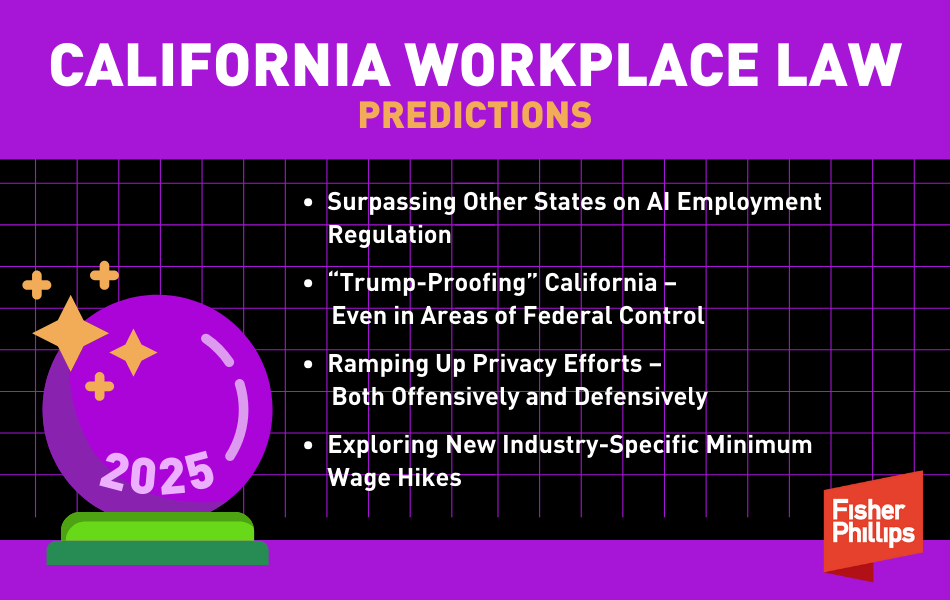FP’s Top Predictions for California Workplace Law Developments in 2025
Insights
1.08.25
Our California thought leaders have pulled together their top predictions for the new year so that employers can get a running start to 2025. If you want more, register for our FP Workplace Law Forecast Webinar here.
California Will Retake the Lead on Regulating AI in the Workplace and Beyond
While a California bill (AB 2930) aimed specifically at the use of artificial intelligence in employment did not make the cut in 2024, it will certainly be back this year. The lawmaker who introduced the groundbreaking legislation – which would have required employers to provide notification (and perhaps an accommodation) to workers when AI is used in certain critical ways during hiring or employment – told Bloomberg (this Bloomberg article is behind a paywall) that she plans to reintroduce the bill in 2025.
Another California bill (SB 1047), which came tantalizingly close last year to becoming law, would have required developers of high-risk AI models to conduct safety tests and implement shutdown mechanisms to prevent critical harms. While Governor Newsom vetoed the bill in September, he said in a veto message that safety protocols must be adopted, and that he was committed to finding “the appropriate path forward, including legislation and regulation.”
Either by legislation or regulation, California will join and likely surpass other jurisdictions that have recently enacted their own requirements in the absence of comprehensive federal regulation.
The Golden State Will Revive Its Role as the Leader of the “Trump Resistance”
California will lead the blue states resisting changes by the incoming Trump administration, in line with Gov. Newsom’s November 6 proclamation. Most of the substantive labor protections in California are already stronger than federal law, but the state will attempt to push the legal envelope into areas of federal control – such as protecting immigrant workers and finding ways to make it easier for employees to unionize.
Specifically, Newsom and the state legislature kicked off a special session on December 2 to propose a “new litigation fund of up to $25 million for the California Department of Justice (DOJ) and state agencies to defend California from unconstitutional federal overreach, challenge illegal federal actions in court, and take administrative actions to reduce potential harm.” Legislation that establishes the fund is expected to be signed into law before January 20.
California Will Ramp Up Privacy Efforts on Both Offensive and Defensive Fronts
California privacy officials recently pushed forward key initiatives that could impact certain businesses and employers, including by initiating formal rulemaking that would significantly impact those using resume screening and other automated decision-making technology. These regulations will ultimately only apply to businesses who are subject to the California Consumer Privacy Act.
In addition, while we expect to see a renewed push for a federal privacy law, the aim of this legislation largely will be to supersede the patchwork of state laws on the books and reduce the perceived administrative burden of compliance – particularly for broad laws like California’s. Any such federal law would avoid touching on employment-related data or providing a private right of action, sparking California and other blue states to file suit to maintain their own comprehensive laws and retain as much power as possible.
The State Will Further Explore Industry-Specific Regulation
Labor advocates succeeded in California this year with the creation of a Fast Food Council, a fast-food specific minimum wage, and a healthcare minimum wage. In a tough environment for union organizing (which may be made even tougher under a second Trump administration), labor advocates will look to explore other creative ways to legislate specific working standards for other industries.
For example, the Los Angeles City Council voted December 11 in favor of a motion that brings the city one step closer to increasing the minimum wage rate for hotel and airport workers to $22.50 per hour starting July 1, 2025, followed by annual increases until reaching $30 per hour in 2028 – just before the city hosts the 2028 Summer Olympics.
Want More?
- Read our entire FP Workplace Law 2025 Forecast for our predictions for a wide range of practice areas and industries.
- Register for our FP Workplace Law Forecast 2025 Webinar.
- Check out our Employer Cheat Sheet to learn more about all the new workplace laws that just took effect on January 1 in California and beyond.
Conclusion
We will continue to monitor developments related to all aspects of California workplace law. Make sure you are subscribed to Fisher Phillips’ Insight System to get the most up-to-date information. If you have questions, contact your Fisher Phillips attorney, the authors of this Insight, or any attorney in our California offices.

